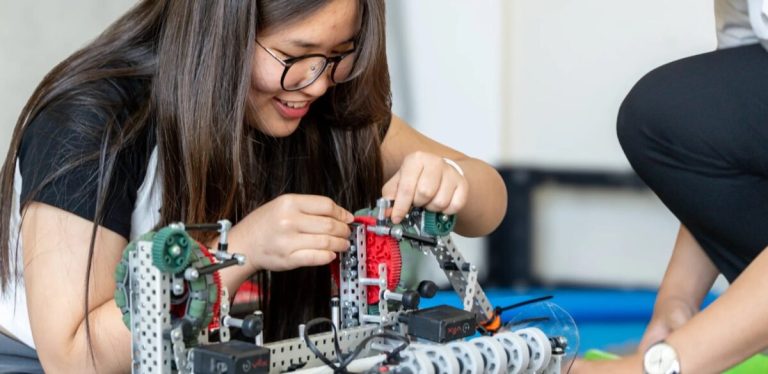BeeSC is buzzing—check out their pollinator gardens + learn how to make your own
Reading time: 4 minutes
Sponsored

Wildflower season is my favorite season, and soon it’ll be in full swing. Birmingham-Southern College plays host to some fantastic pollinator gardens, and we’re taking a closer look. Bonus: learn how to make your own—it’s the perfect activity for social distancing!
Bees love the spring because it’s very swarm outside.

Springtime is the best time, especially if you’re a pollinator. Bees may be the most well-known, but pollinators come in all shapes and sizes. Think—birds, bats, bees, butterflies, beetles and more.
While humans may not always love pollen season (hello, allergies!) it’s a vital time of the year for our ecosystem. The pollination that happens thanks to these helpful creatures allows plants to grow—the plants that:
- Bring us food sources like fruits, vegetables and nuts
- Serve as the source for 1/2 the world’s oils, fibers and raw materials
- Prevent soil erosion
- And a whole lot more
“A great majority of bees have been destroyed by pesticides. By constructing buildings and parking lots, people destroy a lot of the natural meadows and wildflowers that pollinators can feed off.”
Isaura Delgado, Chemistry Coordinator, BSC
On the first day of class, bee students are given a sylla-buzz.

Students at Birmingham-Southern College (BSC) have the opportunity to participate in all kinds of hands-on learning. From painting murals on campus to designing sets and costumes for live shows, the creative outlets are endless.
Hands-on learning is part of the culture and tradition at BSC. It’s one of the reasons they consistently rank as one of the best liberal arts colleges in the country. The opportunity to work in the gardens is just one area of campus and student life that encourages experiential learning.
Pollinator gardens are so easy to make, it’s un-bee-lieveable.

Two lab coordinators at BSC planted this pollinator garden in spring 2019. The wildflowers fill what used to be dry dirt and provide nutrients for pollinators like bees, butterflies, and moths.
Both gardeners themselves, Delgado and Cates originally started to plant in the building’s greenhouse. Along with other science faculty members, they collected seeds from home and eventually moved the wildflowers to the bed when sprinklers were set in place.
Anyone can create a pollinator garden in whatever space they have access to. It’s one of the easiest types of landscaping to begin and keep up. You can find wildflower seed packets for cheap at local plant stores like Shoppe.
Many are self-seeding, which means upkeep is fairly minimal. Just pull some weeds once a week or so and let the pollinators do their thing!
To bee or not to bee, that is the question.

When planting, Delgado and Cates mainly used wildflower mixes. As a result, they never really know what might sprout. The garden now has a wide variety of plants, including daisies, poppies, cosmos, bachelor’s button and basil.
“If we can take a piece of land that we’re not using and provide somewhere that these pollinators can find food, we can try to help a bit.”
Isaura Delgado, Chemistry Coordinator, BSC
Good for the pollinators, good for the soil, good for us. Grab some wildflower seeds and get to planting—fresh air and minimal human contact is what we all need right now!
Want to keep up with BSC? Be sure to give them a follow on Facebook, Instagram and Twitter to never miss an update.
Sponsored by:




